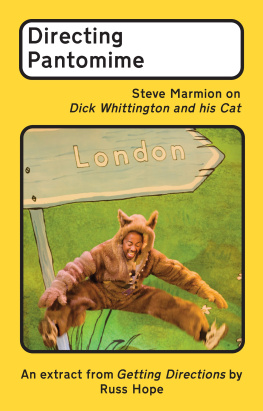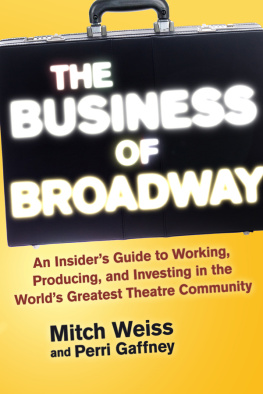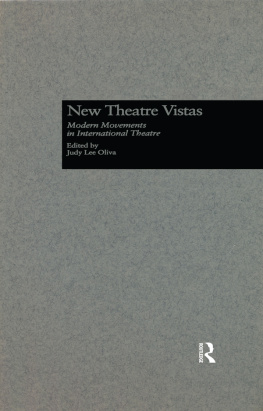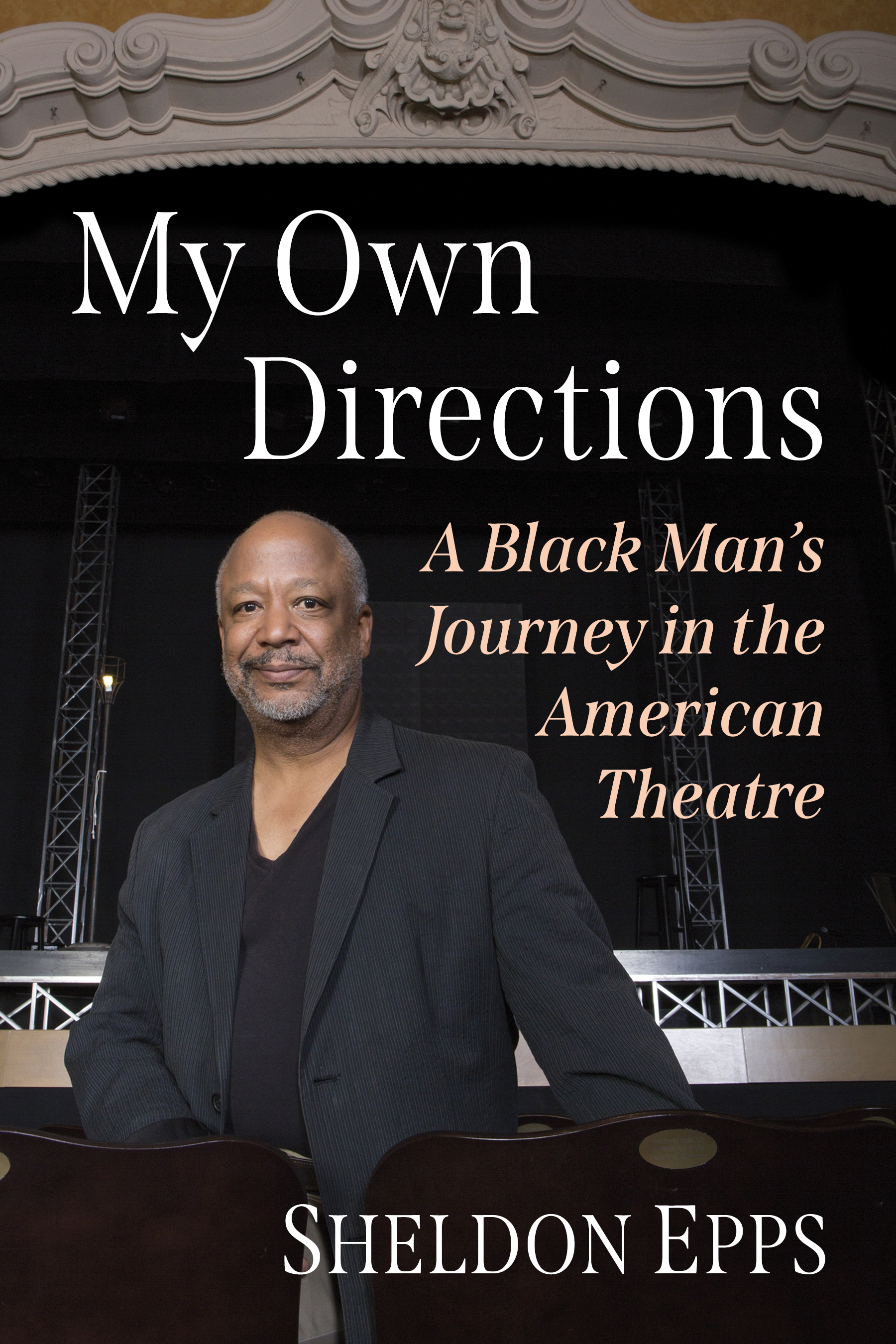My Own Directions
My Own Directions
A Black Mans Journey in the American Theatre
Sheldon Epps

McFarland & Company, Inc., Publishers
Jefferson, North Carolina
ISBN (print) 978-1-4766-8858-9
ISBN (ebook) 978-1-4766-4613-8
Library of Congress and British Library cataloguing data are available
Library of Congress Control Number 2022042988
2022 Sheldon Epps. All rights reserved
No part of this book may be reproduced or transmitted in any form or by any means, electronic or mechanical, including photocopying or recording, or by any information storage and retrieval system, without permission in writing from the publisher.
On the cover: The author at his artistic home, the Pasadena Playhouse (photograph by Jim Cox)
Printed in the United States of America
McFarland & Company, Inc., Publishers
Box 611, Jefferson, North Carolina 28640
www.mcfarlandpub.com
For my loving family, St. Paul, Kathryn, Frances and Braxton.
And for LB, who always pushed me to go further down the road.
Table of Contents
Prologue: Chased by Race
If you are a person of color in America, race is always a factor. Being chased by race is often a terrible reality, and it can sometimes be an advantage. But it is always, ALWAYS a factor in your life. I knew that from a very early age and accepted that as part of my very being. I had no choice. Nor did I want one. I am proud to be a Black man in America, even with all of the challenges, the slurs, the preconceptions and abuses that come along with that designation.
What I also wanted was to be celebrated for my race. That is what I still want, to be celebrated by myself and others for being a Black man in America! A Black artist in America and a Black man in the American Theatre. I have provided myself with that celebration even when there have been attempts for it to be denied by others. I want to be recognized and honored for my race but not to be defined by it, and most certainly never to be constricted or diminished because of what I regard as a wonderful embellishment to my very being. I certainly never wanted to be colorless. God forbid! I wanted the richness of being a man of color to be valued and appreciated. Even glorified! I did not want my race to be seen as a diminishing definition or a limitation. Certainly it never was for me.
This was true from a very early age, as I remember. The fact is that when you grow up in an African American neighborhood, you actually dont walk around thinking about being Black all of the time. Believe it or not, race issues and prejudice are not at the forefront of your thinking ALL of the time. It is simply a part of your existence, much like breathing. You dont necessarily think about it until something makes it difficult for you to breathe. And as we know all too well, that can sadly happen at any moment. But if you have had great support from a loving family and a smart and emotionally well-balanced community, you learn to think about being a person of color as a great advantage. You learn to speak of your race with pride. Also, you very quickly learn that one of your additional burdens in life will be to represent your race well. You succeed, if you succeed, not just for yourself but for those who come along with you, and most certainly for those who will follow. And if you fail, that failure may be used as a reason to deny others opportunities. That challenge becomes a heavy one in many ways, but ultimately it can also be a welcome one. Was that burden sometimes difficult to bear? Without a doubt. Were there rewards and satisfactions to be had if ones success pushed doors open and allowed others to move on up a little higher? Absolutely.
Like many men of color of my generation, especially those of us who have had great advantages on our path through life, I always knew that I shouldered that additional burden. The truth is that I have resented it at times and wanted to set down that heavy load. But I knew that I could not. Why? For many, many reasons. First of all, I had that strong family background and that supportive community. I realize that I was very lucky in that way. I was taught to view my racial heritage and my skin color as rich and wonderful parts of who I am. I was encouraged to think that if I worked hard enough I could do anything I wanted to do and be whatever I wanted to beincluding president of the United States. Literally! Those words were actually spoken. My parents generation was never taught to think in such lofty terms, but that was certainly the lesson broadly taught to those of my age. Those born in the middle of the last century when the world and our nation were becoming more highly evolved. Or so we thought. Not so surprisingly for those who felt that way, the truth of that dream of a Black presidency would be tested and miraculously proven with historical impact and incredible grace and brilliance by one who is only a few years younger than me. If I had that ambition at some point, and perhaps I did, I gave up on it. Not because I felt it was impossible but because I moved on to other lofty ambitions.
For me, that was the desire to have a life in the theater, first as an actor and ultimately for the majority of my career as a director. I decided early on that I wanted the world to think of me not as a Black Director but as a director who had the good fortune to be Black with all of the skills, the wide-ranging knowledge, the soul and the proven ability that went along with that appellation.
Not a great challenge in the world of the arts, right? One would think that at the time that I was forging my career in the latter decades of the past century that this would not be a problem in the supposedly highly evolved world of the American Theatre which was and is presumed to be more liberal and forward thinking than many other fields. Given that, one makes the assumption that this would not have been a great challenge. One would be wrong! I did achieve that goal. At least among those that allowed that goal to be achievable. There were, and sadly there are, many who do not. At this point I can no longer be worried about them. As the great writer Toni Morrison once said, Im tired of it! So Ive decided to let racism be the racists problem, not mine. Those simple words were a great release for me when I heard them, and they allowed this Black man to be defined by his work, his ability, his ambition, and both his failures and his successes, not by the hue of his skin color. That is as it should be.
Blessedly for me it has been that way for many years. Though there are moments that are appalling even now. And most certainly there have been many moments when I have felt the pressure of what James Baldwin and Toni Morrison wisely and poetically identify as the White Gaze. The additional challenge that comes from the desire to exercise your art, but to exercise it freely, without the necessity of proving to white society that you are good at what you do, according to and frequently judged by white standards. The challenges of building and sustaining a life in the theater are great enough, believe me. Meeting your own high standards and constant desires for growth already requires a great deal of strength and tenacity. It takes years to knock the little white man off of your shoulder. To avoid the white gaze and judge your work without looking at it with and through that constantly omnipresent lens. It takes quite a long time to get to the place where you can shut yourself off from that additional obligation. That takes security, experience, probably some success and confidence. It takes a great reliance on knowing what you know! The latter can often be identified as arrogance (and it certainly has been). But believe me, that is far easier to deal with than the judgment and the restricting pressure of that onerous white gaze. That can be the knee on my neck that artists of color have been forced to deal with for many decades. We must fight constantly to get rid of it. We must fight to lay that burden down and stand tall.







